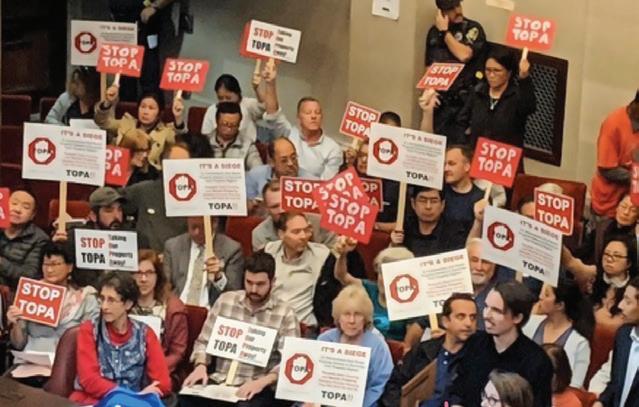
5 minute read
ADVOCATE
LEGISLATION & POLICY UPDATES
SHIFTING SANDS
RAP UPDATE
by Joshua Polston
In the spring of 2020, Oakland Councilmember Dan Kalb proposed a set of modifications to Oakland’s Tenant Protection Ordinance.
The majority of the modifications were focused on protecting renters’ rights to live on the rental property. There was one area, primary residency, that the council did recognize as a potential area for abuse. Some renters, after moving to a new home or place of residence, hold on to their rent-controlled unit and use it as a pied-à-terre or possibly even sublease it to others. Based in part on EBRHA’s advocacy efforts, on May 18, 2021, the Oakland City Council approved modifications to the ordinance that discourage renters from gaming the system once they have moved from a unit. These provisions modify Section 8.22.070.C.1.f and allow the following petitions to the City of Oakland RAP (Rent Adjustment Program): Primary Residency—If the renter no longer uses the unit as a primary home, a property owner may petition to increase the rent to market rate. Rental Arbitrage—If the primary renter is subletting the unit and is charging the subletter more than the actual rent
or proportional share, the subletter may file a petition to contest overcharges.
The changes align the Oakland RAP with provisions already in place in the City of Berkeley.
Due to COVID-19, there ’s a delay in implementation. These provisions will go into effect three months after the end of the current COVID-19 Emergency Declaration by the City Council.
INCREASING RENT?
Laws regulating rent increases vary from city to city in Alameda and Contra Costa counties. Rental property owners and managers, before you consider increasing rents, make sure you know your local laws and are in compliance. Visit ebrha.com/ increasing-rent.html for current information, including helpful links, related to rent increases in your city.
EVICTION MORATORIUM EXTENSION UPDATE
by Ron Kingston
On June 24, 2021, the Biden Administration announced an extension of the CDC federal eviction moratorium through July 31, 2021. The CDC also stated that it does not plan to extend the eviction moratorium past this date, barring any significant changes in public health relating to the pandemic. The decision runs contrary to the position of EBRHA, and we took the position that the CDC’s nationwide eviction moratorium should sunset.
In addition to announcing the moratorium’s extension, the Biden Administration announced that it would implement an approach to promote housing stability via supporting vulnerable tenants and preventing foreclosures. These actions give state and local governments additional time to distribute more than $46 billion in emergency rental assistance.
President Biden’s Administration will also do the following:
• Issue new guidance from the
Treasury for emergency rental assistance to accelerate and broaden delivering state and local government money. • Feature the American Rescue
Plan so state and local governments can use the assistance to fund eviction diversion plans, including counseling and legal services. • Hold a summit on eviction prevention plans, including rental housing owner/tenant mediation strategies. • Ask the DOJ to send guidance to state courts encouraging them to adopt anti-eviction diversion practices. • Accelerate and raise awareness about rental assistance, which involves Treasury, DOJ, CFPB and the USDA.
EBRHA is cautiously optimistic about the Biden Administration’s intention regarding the aforementioned numerated action plan, which applies to California and all of our local governments.
It’s been the position of EBRHA that the moratorium provisions should not apply to our state and local governments because our housing laws are much more restrictive than those imposed by the federal government. They unfairly intervene to further shift a greater economic burden to rental property owners. The moratoriums essentially canceled private contracts of rental property owners, who have provided an essential housing service to residents during the pandemic. At the same time, there is virtually no consequence for renters who are not seeking rental assistance or are refusing to pay rent.


TOPA FAQS
What is TOPA, and how will it impact housing providers? The “Tenant Opportunity to Purchase Act (TOPA)” is eminent domain in disguise. The Berkeley City Council is currently considering the ordinance, which is being sold as a way to control rents, prevent displacement and promote ownership opportunities for renters. But in reality, the ordinance will not create real buying opportunity for residents or increase the number of housing units. It presumes residents are disadvantaged to manufacture conflict with property owners. It’s a front to grant government and special interest groups the power to dictate property values and gives preference to certain buyers over others.
What is the current status of TOPA in Berkeley? EBRHA members and other pro-housing affiliates appear to have made an impact on Berkeley’s mayor, as he appears to have officially put the TOPA ordinance on hold for now. EBRHA asked its members to write to the Berkeley Council and call into the Berkeley Land Use Committee meetings. We communicated how the TOPA ordinance authors did not perform an equity study, how TOPA would only serve to reduce investment in rental housing in Berkeley, and how it would all but kill off the opportunity for 1031 exchange buyers to reinvest in Berkeley. We’ll be in touch when we hear what the City of Berkeley will do next. Hopefully, the City of Oakland also understands the negative impacts TOPA would have on our community.
I do not own property in Berkeley. Why should I voice my opposition during Berkeley TOPA meetings? We urge ALL East Bay housing providers to attend TOPA meetings because if TOPA is passed in Berkeley, Oakland and other East Bay communities will be next. We must join our counterparts in Berkeley to help STOP TOPA right in its tracks.
How can I help stop TOPA? • Sign the Berkeley Stop TOPA petition: change.org/p/berkeley-city-council-oppose-berkeleys-topa-ordinance.
• Participate in City Council meetings and voice your opposition to TOPA.
• Watch out for EBRHA’s member Red Alerts regarding key meeting notices and calls for action.


Above: In 2020 (pre-pandemic), EBRHA members participated in a protest against Berkeley’s TOPA ordinance.










